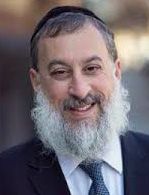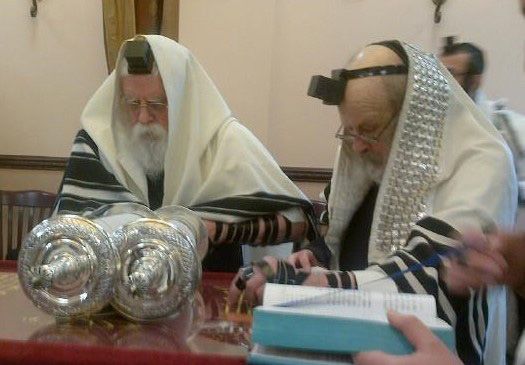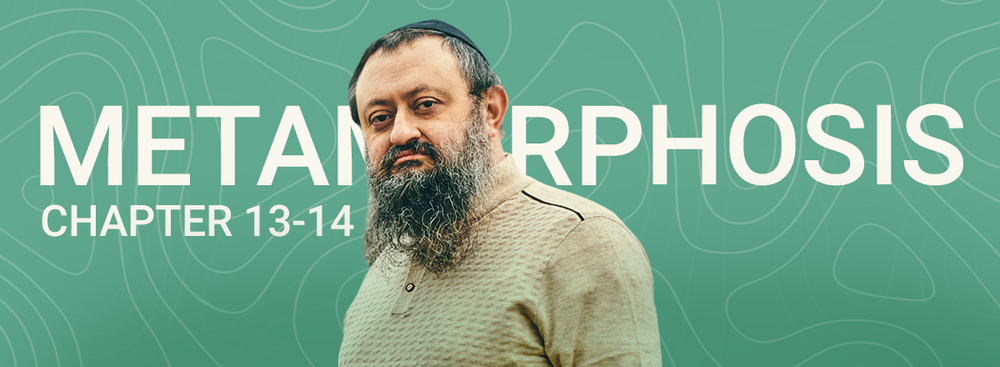In 2018, Dr. Vladimir Zelenko published an autobiographical book Metamorphosis, in which he talks about how he, being a completely non-religious young man, came to faith, and how he overcame a serious illness. The book has multiple positive reviews online and was well received by the readers all around the world.
Today, we are publishing the thirteenth and the fourteenth chapters of the book.
§13
PRIVATE PRACTICE
After working for Ezras Choilim Health Center for five years, I decided to leave and open my own practice. Most doctors are terrible executives and have no idea how to start and run a medical practice. I had to learn everything from the beginning. Fortunately, I had several friends who were successful executives and they were willing to advise and help me. I had to borrow a lot of money to build out my office and for startup expenses. Giving up a guaranteed salary and going into debt to start a business took a real leap of faith. I had four children at the time and was not sure how I was going to meet my monthly expenses. What I noticed was that becoming an employer instead of an employee made my relationship with G-d more intense and intimate. I found myself talking to and asking G-d for help much more often.
Even though running a business had many headaches associated with it, I really enjoyed the autonomy of being selfemployed. I was free to create a family work environment built on respect. My employees really enjoyed coming to work and this translated into loyalty and positive energy in the office.
My patients benefited from an office built on positivity and my sincere desire to help them.
Soon after opening my office, my mother called me from Brooklyn and asked me for a job. She was tired of working in the cutthroat corporate world. Every year a new set of young graduates would start working at Morgan Stanley. They were all hungry for advancement and were ready to step on everyone to get ahead. This reminds me of my past self. My mother was around fifty-five and had lost interest in playing these corporate games.
I was very happy to work with my mother. She is very intelligent, hardworking, and loyal. I trusted her implicitly and she became my office manager. However, there were some minor complications when working with my mother. The line between mother and employee became blurred. Hashem promises long life for properly honoring your parents because this commandment is exceedingly difficult to fulfill properly. I found it difficult to set healthy boundaries with my mother in the office. One time my mother walked into my private office without knocking and found me performing a sensitive examination of a male patient. Since then, she knocks on my door before entering.
Soon after my mother started to work in my office, my parents moved to Monroe. They moved out of their Brooklyn apartment that they had lived in since coming to America, thirty-nine years before.
I helped them find a beautiful townhouse in Monroe. I was happy to have them live closer to us (free babysitting). My children really benefited from having my parents living closer to them.
Not long after starting my practice, I became inspired to open a synagogue next door to my office. With the help of my good friends, we built a beautiful shul called Beis Medrash Shneur Zalman. It was named after Rabbi Shneur Zalman, the author of the mystical text, Tanya, and the Code of Jewish Law. We held daily prayer services and I gave a class in the Tanya.
What was unique about this shul was that it blended Jews from all different lifestyles and levels of observance. There was a sense of real unity and brotherly love.
One of our regular attendees was Rabbi Fivel Weiss. Reb Fivel was known to possess one of the broadest and most brilliant minds in the Satmar movement. He was in his seventies and unfortunately had no children. I became extremely close with Reb Fivel and he became one of my most trusted mentors. We had a shared passion for learning deep mystical and Chassidic texts.
Rabbi Weiss was instrumental in my spiritual development. Reb Fivel’s life was a testament of Jewish maturity and faith. Even though he was not bless- ed with children, he accepted G-d’s will and decree without resentment. I had many deep conversations with him over the years and was extremely impressed by his humility and connection with G-d.
Reb Fivel observed that I invested a lot of time into helping others but not enough effort into my own personal refinement. He helped me realize that I was using my outreach activities as an excuse and justification for not working on myself. He taught me to focus inward and confront my personal demons that were obstructing my spiritual and emotional growth.
One of these demons was my persistent feelings of low self-esteem. I had thought that my spiritual journey would help me overcome my feelings of low self-worth and perhaps it did to some degree. However, I still suffered emotionally and felt that I could be happier and more at inner peace than I really was.
I decided to see a professional and contacted Rabbi Daniel Schonbuch. He is a highly trained and experienced psychotherapist. As a side note, you the reader may be wondering why I am sharing with you my deepest fears and vulnerabilities. I have now been a doctor for many years, and I have seen and treated an unusually high volume of patients. I have observed and concluded that the most undertreated illnesses are emotional and psychological in nature. I have seen many families devastated by untreated mental illness. One of the major obstacles to patients getting appropriate help is the social stigma associated with psychological problems. My hope is that by sharing with you my emotional struggles, it may lessen the stigma and other people may seek help.
Rabbi Schonbuch helped me recognize some of the root causes of my negative feelings about myself. During one therapy session, I was in a somewhat hypnotic state and remembered an event that happened to me when I was five years old. I was in the back seat of my parents’ car.We were driving on Ocean Parkway in Brooklyn on a nice summer day. My window was open, and we were stopped at a red light. Another car with two people inside pulled up parallel to my parents’ car. I overheard the woman in the car point to me, and say, “Look at that ugly child.” As a five-year-old child, I was defenseless, and these words must have been deeply painful and damaging to me. I did not possess the psychological skills to properly deal with this assault on my selfesteem.
Fortunately, emotion lives outside of the realm of time. This means that a person may literally go back to a past emotional event. He can then relive that event, feel the pain, and more importantly reprocess what happened. Most people repress painful feelings as a defense mechanism. Unfortunately, this results in emotional weight that never goes away and frequently resurfaces with interest.

Rabbi Schonbuch helped me focus on this story and describe my emotional response to being called “an ugly child.” He then guided me to reprocess the event using my mature forty-three-year-old mind. Being called ugly by someone else now would have minimal effect on me at this stage of my life.
My soul is a literal part of G-d, and my worth is based on my relationship with the Creator of the Universe. Reinterpreting the painful event with the above mentality freed me from emotional baggage that was weighing me down.
Reb Fivel’s devotion to learning Torah, to prayer, and to his connection to G-d reminded me of Rabbi Gafne. One day, I called Rabbi Gafne in Israel to see how he was doing. Since leaving the yeshivah in 1998, I had kept in touch with him. He is my spiritual mentor. He told me that he was not feeling well lately and that he’d had a stroke a few weeks before. He was taken to the hospital, and, while waiting to be seen, his symptoms of the stroke resolved. When the doctor evaluated him, he was told that he could go home and follow up with his primary care doctor. He was also told that if the symptoms recur he should come back to the emergency room.
I was shocked by the professional negligence of this story. I told Rabbi Gafne that he needs to have further testing to figure out WHY he had the stroke. I suggested the appropriate testing and asked him to see his doctor as soon as possible. He called his doctor and got an appointment in two weeks. His doctor agreed with my recommendations and ordered the appropriate tests. Rabbi Gafne got an appointment for the tests 2 weeks later. After doing the tests, he received the results one week later. It had been approximately five weeks since my initial conversation with him. The results showed that Rabbi Gafne had a major blockage of blood flow in the main artery that took blood from the heart to the brain.
This was the cause of his stroke and he was at severe risk to have another one. I suggested that he come to New York to be treated immediately. After consulting with his family, he agreed, and I bought him a first-class ticket to come to America. I met him at the airport and took him to Lenox Hill Hospital. This is the hospital to which I frequently admit my patients. I was well acquainted with some of the best doctors in the world, who are on this hospital’s staff.

I called Dr. Gary Roubin, a world-famous interventional cardiologist and a pioneer in the field of angioplasty and stenting. I asked him to do me a favor and see Rabbi Gafne as soon as possible. Dr. Roubin agreed and evaluated the patient an hour or so later. He suggested an immediate corrective procedure to fix the 95 percent blockage in the neck. Before the procedure, I pulled Dr. Roubin aside and asked him to do me a favor and examine his heart for any blockages.
The procedure to fix the blockage in the neck was a complete success. However, the examination of the heart showed blockages that would require multiple stents. Rabbi Gafne would have to recuperate for one month and then have the heart procedure. During this month, he lived in my house in Monroe.
It was a real privilege to have Rabbi Gafne stay with us. I carefully observed and studied his daily routine. To me, he exemplifies a person whose inner and outer being is one. He is a blend of genius and humility. Rabbi Gafne and I would go together to learn and pray in Kiryas Joel. His magnetic aura was quickly noticed and many Satmar Chassidim approached him for advice and counsel. It is not surprising that Reb Fivel and Rabbi Gafne gravitated toward each other. Even though they came from wildly different backgrounds and spiritual paths, the result was very similar. Both deeply connected to G-d, humble, and possessing refined characters, it was a true privilege and pleasure to watch these two special men discuss spiritual matters of Divine service. They seemed like kindred spirits and it was a real kiddush Hashem[1] to watch their achdus (unity) and friendship. Even now, many years later, people still reminisce and talk about Rabbi Gafne’s stay in Monroe.
kiddush Hashem (lit., “sanctification of G-d’s name”): an action that inspires others to revere (or to increase their reverence toward) G-d. ↩︎

After a month, Rabbi Gafne had a successful heart procedure performed by Dr. Roubin. He needed to recuperate and so he stayed in my house for another month. My bond with Rabbi Gafne is difficult to articulate in words. We share a deep and soulful connection. After recuperating, Rabbi Gafne returned to the Land of Israel to continue inspiring and educating the next generation of G-d’s soldiers.
As I am writing this, I noticed an interesting connection. In 1998, I was a student in Rabbi Gafne’s yeshivah. I was contemplating leaving medical school and becoming a rabbi. Rabbi Gafne had advised me to finish my medical studies and serve G-d as a doctor. His advice may have very well saved his own life.
In 2014, we moved from Monroe to Monsey. My children were all going to school in Monsey and transportation had become prohibitive for us. It was much better for them to live closer to school since it cut down on the time they spent on the school bus. Socially, they were closer to their friends and were able to participate in more after-school events.
Since I was living in Monsey, I decided to open a satellite office there. I enjoyed the change of pace. The patients in Monsey came from very diverse backgrounds. I had Satmar,Vizhnitz, Lubavitch,Belz, Bobov, and Litvish patients. There were also wide ranges in levels of Jewish observance. Monsey represents a microcosm of the Jewish people as a whole. In contrast, my patients in Monroe were uniform regarding being Satmar and their high level of observance.
While it was much better for my family to live in Monsey, I really missed living in Monroe. I had established a routine that provided me with spiritual structure. I had my chavrusas to learn the Torah with, a mivkeh that I would use every day, and my shul that I had built. I thrived spiritually, intellectually, and emotionally in Monroe. I found it exceedingly difficult to recreate this structure in Monsey. However, I did meet some wonderful people. I became friends with David Shmuel Greenstein, who I met at Rabbi Yaakov Twerski’s shul in Wesley Hills. David Shmuel was a brilliant lawyer who had graduated among the top of his class from Yale Law School.

We became chavrusas in a nighttime semichah[1] program. I really enjoyed learning with his brilliant mind.
Around the time that I moved to Monsey, Reb Fivel Weiss became seriously ill with a bone marrow disease. Besides treating him myself, I would also go with him to his specialist doctors. I was impressed at how he handled his illness with grace, faith, and humor. He wanted everything done according to Jewish law. This meant that every medical option needed to be explored to prolong his life. However, he was realistic about his situation and frequently told me that no one knows how long he or she is going to live.
Even while being sick and feeling weak, Reb Fivel continued to come to our shul and learn with me. It seemed to me that he had intensified his prayer and learning with literal self-sac- rifice. Reb Fivel’s wisdom helped me navigate very difficult personal struggles that I had in my private life.
In 2016, Reb Fivel needed to be hospitalized due to complications of his illness. He knew that his time in this world was ending and he asked me specifically, “How long do you think I have to live?” I told him that I am not G-d, but that I thought he only had a few days left. He thanked me and began to prepare himself. The passing away of Reb Fivel left a huge void in my life. I lost a mentor and friend. Reb Fivel told a few people that he viewed me as a son. He was filled with Divine wisdom and life experience. I was truly privileged to know and be close to him.
semichah program: a curriculum of Torah and Talmudic learning geared toward achieving ordination as a rabbi. ↩︎
§14
DIVORCE
A few weeks before Reb Fivel was hospitalized, my marriage with Sima Chana ended. This topic is very difficult for me to write about because she was my wife for fifteen years, we had six beautiful and precious children together, and my children will be reading this. The nature of humanity is to be curious about scandalous gossip. However, our divorce was not scandalous at all. We simply grew apart over the years and had completely different goals for our personal futures. We both share an intense love for our children and are trying extremely hard to work together to ensure that they thrive and continue to be erliche (sincere) Jews.
I was very moved when Reb Fivel came to visit me in my office after I got divorced. He was very week and had trouble breathing and walking, and yet he still came to comfort me. I feel a raw wound in my soul when I think of my dear friend and teacher. I miss Reb Fivel terribly.
At the time of the divorce in 2016, my six children were: Levi Yitzchok, 14 years old; Esther Tova, 12; Eta Devorah, 9; Nochum Dovid, 7; Shmuel Nosson Yaakov, 6; and Menachem Mendel, 4. Each child reacted to the divorce in their unique way.
The two younger kids, Shmueli and Mendy, were nonchalant about it. They just wanted to know when and how often they would see me. Shmueli asked me whether “I was still his father.” When I explained to him that I would always be his father, he smiled, kissed me, and went to play with his Legos.
Nochum took the news the hardest. We are extremely close, and it felt to me that his world was unraveling. He held on to my arm and refused to let me go. It is emotionally devastating to see your children in pain. I had to take Nochum with me to my parents’ house to console him and help him better understand what was going on.
Eta also took it hard and was very confused. She is a bit older, and with the proper explanation, she relaxed somewhat. Eta is very close to her mother and that helped with the transition.
My daughter Esther said, “I knew that this was coming.” I was amazed and shocked by her insight. I had not known that this was going to happen. We also did our best to shield the kids from our disagreements. I guess kids have an intrinsic sense of the dynamics between their parents. Yitzy was initially shocked and very upset. However, after seeing how upset I was, he refused to leave my side. He went with me to my parents’ house to keep me company. He told me that he “doesn’t want me to be alone.”
One time he was crying, and I asked him why. He said that he was crying because of my pain rather than his own.
The trauma of moving out of my house into my parents’ house in Monroe and leaving my children was horrific. I love my children and they are the focus of my life. I have always been very close to them. I enjoy spending time and just being with them. The thought of not having access to my beautiful children daily was devastating. I felt that the structure of my life was coming apart.
Moving into my parents’ house in Monroe was an act of psychological regression. They took amazing care of me. They fed me, did my laundry, kept me company, and provided me with emotional support. However, I was a forty-three-year-old successful doctor who had been living on his own since the age of eighteen. Living back with my parents was a surreal experience. My father would ask me if I’d changed my clothes and taken a shower, etc. Living with my parents was a welcome but short-term solution.
I received conflicting advice regarding the divorce process. However, I gave Sima Chana a Jewish divorce (get) immediately and without any preconditions. Some people felt that I was foolish in that I surrendered a very powerful source of advantage when it came to child custody and financial negotiations. However, I do not believe that it is proper to use a religious device as a source of manipulation. After giving her the get, Sima Chana became my ex-wife in the eyes of G-d. The “civil” divorce would take another year and a half to complete.
When the news of the divorce spread in Kiryas Joel, there were different reactions from people. Most friends and patients of fered their well wishes and gave me brachos for the future. I was really touched by how some of my friends wanted to keep me company and preoccupied. I am very grateful to them for being there for me when I really needed it. Working also helped me, but I found myself frequently crying between patients.
The best analogy for getting divorced is an amputation. The procedure may be necessary, but it is still very painful. Fortunately, I had a wonderful support network of family and friends who helped me during this transition.
However, being single created some complications that needed to be dealt with quickly. I am a family physician serving an ultra-Orthodox Chassidic community. It is proper for someone in my position to be married and settled. For example, Hatzolah does not accept single members. I felt that, for professional reasons, I should start looking for a new wife as soon as I felt emotionally ready. In addition, I wanted to have a place of my own that my kids could come to and call home. I was also lonely. G-d’s states, “It is not good for man to be alone.”
One month after getting the divorce, someone suggested a woman who I might find interesting. I called her, and we had a brief talk. When I asked her where she lives, she said “somewhere between heaven and earth.” I told her that I think she should stay there, and I continued my search for a wife.













